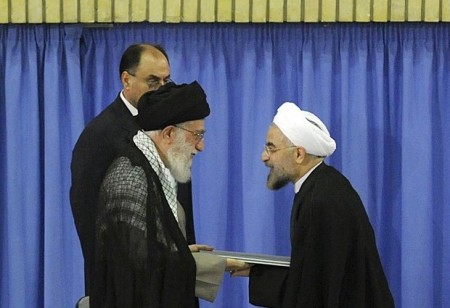As President Rouhani took to social media to promote his policies on gender equality, the Supreme Leader set the record straight regarding his own views.
Over the past week, President Rouhani has used his English-language Twitter account to express and promote his administration’s stance on women’s rights. The President began by tweeting about his appointment of Marzieh Afkham as Iran’s first female Foreign Ministry spokesperson.
On August 29, Rouhani tweeted:
Our new FM spokeswoman, Mrs Afkham, has background affording her strong understanding of world 2day #competence pic.twitter.com/FB5HL1E3Y0
— Hassan Rouhani (@HassanRouhani) August 29, 2013
The President then added:
Appointment of Mrs Afkham just one step in Government of #Prudence and #Hope's campaign to empower and elevate women in #Iran.
— Hassan Rouhani (@HassanRouhani) August 29, 2013
On Monday, Rouhani took this theme further, praising Iranian women for their accomplishments, even using the hashtag #GenderEquality:
Iranian women are educated, capable & powerful. In this Gov. we're hoping to ensure equal opportunity #GenderEquality pic.twitter.com/7rjtqBYQ5D
— Hassan Rouhani (@HassanRouhani) September 2, 2013
However, the Supreme Leader — perhaps feeling that the President was taking the limelight on such an important and controversial issue — could not stay silent.
On Monday, Ayatollah Khamenei took to Twitter to promote his own views on the matter, and to drive home the point that he has been talking about women’s issues for some years now, by repeating a quote he made back in 1998:
زن و شوهر 2 #رفیق هستند. یك جا مرد بایستی كوتاه بیاید، یك جا زن. تا بتوانند با هم #خوب زندگی كنند. 19/1/77 https://t.co/K3btoZeqzu
— khamenei.ir (@khamenei_ir) September 1, 2013
The Supreme Leader linked to a Facebook post his office has made, which sets out his opinions more fully in both Persian and English. Khamenei also includes an illustration, to help drive the point home:
It is not true that the wife should obey the husband in every occasion, no. There’s no such thing in Islam or Sharia law. That “men are in charge of women” [as said by the holy Quran] does not mean that a woman should obey her husband in all affairs. No! Or according to some Europeanized individuals carried away by European [standards], acting worse than them, the woman should control everything and the man should obey her. This is also wrong. A couple is about two companions, two friends. Sometimes the husband should back down, sometimes the wife. Sometimes the man should give up on his interests sometime the woman should give up on hers, so that the two can get along and live a life together.
As Rouhani continued to tweet his messages about women’s rights on Monday, the Supreme Leader took to Twitter again on Tuesday — in English this time — to ensure that it is absolutely clear who is in charge. While Rouhani used more Westernized language to talk about women —referring to their professional accomplishments and showing an image of women graduates — the Supreme Leader preferred a more old-fashioned approach, comparing women to lovely, yet delicate, flowers. How could men, he asks, treat a delightful flower oppressively?
Islamic teachings say #woman is a flower.How oppressive&evil of a man 2treat a flower aggressively,uncaringly& w/out appreciation.#LifeStyle
— khamenei.ir (@khamenei_ir) September 3, 2013
But what of educated women? Women with professional jobs? The Supreme Leader is quite clear on this point: those women (even politicians) are also “flowers”:
U can’t leave all tasks 2ur #wife&then criticize her.Even if she’s a scientist/politician,yet when interacting within family,she’s a #flower
— khamenei.ir (@khamenei_ir) September 3, 2013
Women do have some autonomy, however:
It is not true that the #wife should obey the husband in every occasion. No, there’s no such thing in #Islam or Sharia law. #LifeStyle
— khamenei.ir (@khamenei_ir) September 3, 2013
The Supreme Leader warns about “Westernization” — women should avoid it:
Or like westernized ppl bragging abt being open-minded,we don’t say #woman shud control everything & man should obey her.This is also wrong.
— khamenei.ir (@khamenei_ir) September 3, 2013
Khamenei closes by reminding his readers of his main point: that men and women in a relationship should be friends:
Husband&wife r 2 #friends.Sometimes the man shud back down,sometimes the woman,so they can live a #good life together pic.twitter.com/F4esyNZkEm
— khamenei.ir (@khamenei_ir) September 3, 2013

